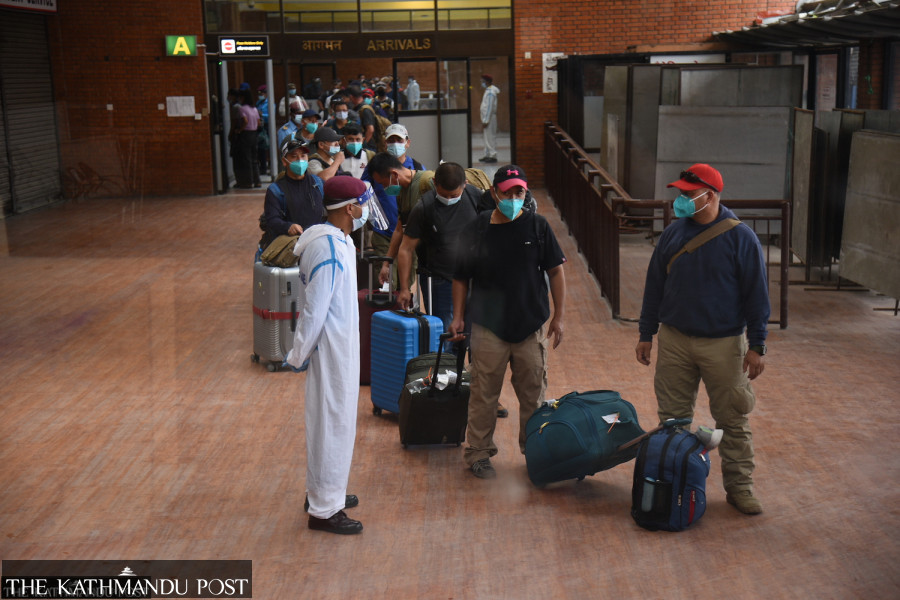National
Nepal’s evacuation lessons after Afghan and Ukraine crises
Kathmandu’s poor diplomatic presence, lack of resources, laid-back attitude and weak administration hamper rescue, officials say.
Anil Giri
When Russia invaded Ukraine on February 24, Nepal was completely unaware of the number of Nepali nationals in the Eastern European country. As tensions escalated, people started to flee the war-hit country and countries across the world rushed to evacuate their citizens. Nepal neither had plans nor the wherewithal.
India launched its rescue operation dubbed “Operation Ganga”. As many as six Nepalis, four on Saturday, were evacuated by the Indian government along with its citizens.
Last year in August also, when the Afghan capital fell to the Taliban, the Nepal government could not do anything to rescue its citizens. It did not have the data on Nepalis in Afghanistan. As it scrambled to bring Nepalis home, Kathmandu looked to foreign powers for help.
Two back-to-back struggles to evacuate its citizens from the crisis-hit countries, officials and diplomats say, are bitter experiences which should serve as a lesson for Nepal. According to them, evacuation from these two countries was arduous and tricky due to several reasons, including Nepal’s poor diplomatic presence.
“How strong a country’s diplomatic presence is is extremely important when it comes to evacuations,” said Ramesh Khanal, Nepal’s former ambassador to Germany, which is currently accredited to look after Ukraine. “In the Ukraine case, our diplomatic presence was poor because we had not even presented our letter of credence.”
The Embassy of Nepal in Moscow was earlier accredited to look after Ukraine affairs. After Kyiv’s constant request that the accreditation be shifted to any other European country, the government of Nepal changed it to Berlin from Moscow in 2016.
Khanal could not present his letter of credence in Ukraine while he served as Nepal’s ambassador to Germany. Ramkaji Khadka, the present ambassador to Germany, has also not done so yet and there is no certainty when he will be able to, given the ongoing war.
While Ukraine and Afghanistan are two recent cases, Nepal has a patchy record of evacuation of its nationals during crises in other countries in the past.
When Iraq invaded Kuwait in 1990, the Nepal government had sent a Royal Nepal Airlines plane to Kuwait to bring back its citizens. In 2014, Iraq faced a crisis after the Islamic State launched a deadly attack. Nepalis in the Gulf country were trapped. After clamour from relatives of the Nepali nationals working in Iraq, the Ministry of Foreign Affairs sent Arjun Kant Mainali, who was an under-secretary, to bring back Nepali citizens home.
Mainali told the Post that he had to stay in Kuwait for over two weeks to get clearance from Baghdad to enter Iraq.
Though the Nepali embassy in Pakistan was accredited to look after Iraq, due to the amount of fear and escalating tensions, the government sent Mainali directly to Baghdad for the evacuation bid.
“Our present accounting system also comes as a big hassle, as some rescue missions become tricky where we face unplanned expenses. There is no system to address such concerns,” said Mainali. “Then how resourceful we are also matters a lot. One needs money, a proper system and good information sources.”
Diplomats and officials say there have been political and bureaucratic hassles when it comes to rescue operations for countries like Nepal. Even if the officials are well aware of the degree of the crisis and need to launch evacuation missions, they have to wait for directions from the political leadership, which is often quite slow to respond, according to them.
At the end of 2019 and the beginning of 2020, the Nepal government met with massive criticism for failing to bring Nepalis home from Wuhan of China, where the coronavirus pandemic started. Beijing swiftly imposed lockdowns in various cities, including Wuhan.
The Nepal government for weeks could not figure out a way to evacuate its citizens. After a delayed response, Nepal on February 25, 2020 brought back 175 of its citizens, mostly students, from Wuhan.
In the Afghan crisis of August last year also, confusion persisted for days. There was no diplomatic presence. The accreditation to look after Kabul affairs was shifted to New Delhi from Islamabad. Nepal’s Ambassador to India Nilamber Acharya had even presented his letter of credence in Afghanistan.
Nepal itself may have lacked in carrying out rescue operations in crisis-hit countries but it has always received support from India and other friendly nations.
“Recent back-to-back cases in Afghanistan and Ukraine show that we should have good relations with major countries and humanitarian organisations,” said Ram Prasad Subedi, chargé d'affaires at the Nepali embassy in New Delhi, who coordinated both rescue efforts. “In some cases, we struggled also because of Nepalis living illegally.”
According to Subedi, resources are key but good relations with immediate neighbours and powerful countries play an equally important role.
As far as Nepalis in Ukraine are concerned, officials say most of the Nepali nationals have already left the country.
According to Khadka, the ambassador to Germany, 580 Nepali nationals have reached several European countries like Poland (466), Slovakia (87), Romania (28) and Hungary (8) as of Saturday.
“Six Nepalis who were rescued by the Indian government have arrived in Nepal,” said Khadka.
After the Russian invasion of Ukraine, the government had instructed Khadka to visit the Poland-Ukraine border in order to take stock of the situation and extend support to Nepali nationals who needed to be evacuated.
Mainali, the former under-secretary, says the government needs to keep track of its citizens in different countries to the extent possible so as to make rescue missions more effective.
“We need to have a robust administrative system,” Mainali told the Post. “As long as we have this lackadaisical approach and the attitude that somehow Nepalis will manage to flee, our people will continue to suffer when they are caught in a crisis.”




 16.12°C Kathmandu
16.12°C Kathmandu















